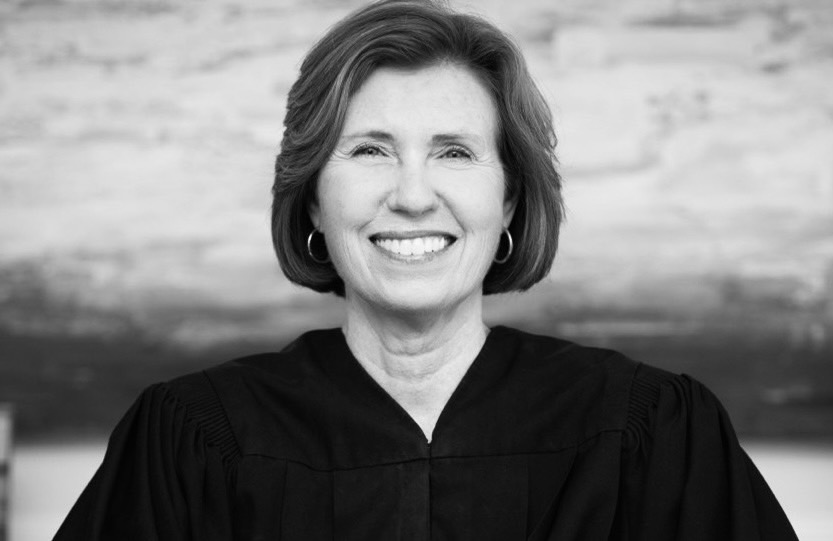Meet Elizabeth Rochford, the Democrat running for Illinois Supreme Court
Illinois Supreme Court candidate Elizabeth Rochford talks ethics, her policies, and the Illinois Supreme Court ahead of midterm elections
Judge Rochford for Supreme Court
Judge Elizabeth Rochford, a Democrat running for a seat on state Supreme Court, has been a Lake County Circuit Court Judge for a decade.
October 26, 2022
Judge Elizabeth Rochford is a Democrat running for Illinois Supreme Court against Republican Mark Curran. She talks of her qualifications, experiences, and policies she has already put in place ahead of the Nov. 8 election.
Read our interview with Curran here.
What do you want us to know about you as a person?
I’m Judge Liz Rochford, and I think the thing to know about me as a person is that I was raised by parents who were public servants and really established a model of service above self. That has been a really inspiring thing for me throughout the course of my professional and adult life, first as a teacher, and then as an attorney, and most recently as a judge. So I think that what’s at my heart and center, is that concept of serving your community and service above self.
What makes you stand out amongst other politicians?
Well it’s interesting, I’ve never really thought of myself as a politician, but I guess I am one now because 17 months ago I began this journey and it is a political journey. It’s been very interesting for me and really has been so challenging and exciting in so many ways. I don’t really think of myself as a politician, but I think of myself as a public servant.
There are three things that distinguish me in this particular race. I would never be running for any other office than a judicial office, that’s my life work and focus, and the three things that distinguish me for this particular race is experience in and around the courthouse and as a judge. The second thing is leadership experience. Leadership among attorneys and judges both locally and at a statewide level, and then service. The service component is two parts, its service in the courthouse and service connecting the courthouse to the community. So those I’d say are the three things that really distinguish my candidacy from my opponents.
Can you tell me more about your qualifications and why you’re labeled as the most qualified candidate?
So that evaluation is done by bar associations that are non-partisan, it’s legal peers that do the evaluation and there’s a written application and an oral interview with a panel of attorneys and retired judges, and then there’s also polling that’s done among the community of attorneys.
I think the things that have established me as especially qualified is experience in and around the courthouse. That’s been 35 years of work in the courts. I have been an assistant state’s attorney in both the appellate and the criminal division. I had a private practice for more than 20 years [and] was a commissioner of the court of claims, hearing trials against the state of Illinois. I heard those trials and wrote those opinions for 23 years.
I also have experience as a hearing officer for towns and then 10 years on the bench. During my 10 years, I have been in the criminal division, the family division, and currently in the probate division. That legal experience is part of the qualification, but again that leadership piece as a past president of the Lake County Bar Association. I’m a past president of the Illinois Judges Foundation and vice president of the Illinois Judges Association.
Again speaking to that service piece, the Illinois Supreme Court issued a mandate to civil courts to provide access to justice for all people, especially the poor and the vulnerable. I’ve spent a significant portion of my career translating that beautiful lofty and tangible, into a boots on the ground reality.
Specific things that I have done have included creating a guardianship help desk to help families navigate getting guardianship from minor children where parents are absent and they need to establish legal authority for the children. I also took the lead on establishing the first of its kind in Lake County, a courtroom dedicated to serving self-represented litigants in family law.
And then in connecting the courthouse to the community, things like developing a program called Paging it Forward where judges are in schools regularly reading with children K-4, advancing literacy, and also talking about civics at a very early age.
I started a program called You Be The Judge where I’m in high schools putting students in the black robe and giving them the gavel, while other students argue real civil cases to understand the challenge of weighing difficult decisions and making ultimate rulings based on facts and law, and then seeing how it affects and impacts real peoples lives. We have another program called Your Future Your Choice where we talk to students about the decisions you make at an early age and how they can have long term consequences.
Most recently, I’m very committed to issues regarding mental health and building bridges from the courthouse into the community for resources, reducing stigma and helping people, educating judges about how to address issues of mental health in the courthouse and then helping people find the right resources that they need. It’s really kind of the broad scope of my experience, commitment to service and leadership, it’s all of those cumulatively that establish my rating as highly recommended and highly qualified.
You said you were a commissioner of the Illinois Court of Claims. Can you tell me more about what went into that experience and what you got out of it?
It was really, really interesting. So as I said, the Court of Claims is where you sue the state of Illinois and those cases, there’s a broad scope of cases. You could be injured on a state highway and you might bring up an action against the state of Illinois. You could have a claim against a state of Illinois hospital or a state of Illinois university. You could be a crime victim and have your claim denied and then your claim would come to the Court of Claims for reconsideration. I regularly traveled to prisons to hear when prisoners had property damage or property conversion, or if they were injured on the job in the prisons.
Just a broad scope of really fascinating and interesting cases, anything could be contract claims against the state of Illinois if you had a contract with the state that you felt had been breached. Really any kind of case you could hear in circuit court you could hear in the Court of Claims, it’s just the defendant is always the state of Illinois.
It was a wonderful opportunity to hear all kinds of interesting cases and see all kinds of very talented attorneys presenting and arguing those cases. I would write written opinions that would then go to a panel of judges and then they would make the ultimate decision. I really enjoyed the work and it was a wonderful opportunity for me and I learned an enormous amount in the process.
Can you tell me about the policies you’ve put in place regarding the legal system and low-income families?
What you might be referring to is establishing avenues for parties who have less financially privileged circumstances. For example, in family law cases for self-represented litigants who have a family issue before the court where everything they care about most is at risk — their children, their homes, their finances — but they don’t necessarily have the financial resources to pay attorneys so by creating a courtroom that serves self-represented litigants exclusively, we created a wonderful opportunity for there to truly be access to justice for all people, not just based on your financial ability to pay, that’s one example.
Another example that I referenced earlier was establishing this guardianship help desk. If parents are absent it could be for a great variety of reasons — they could be deceased, incarcerated or absent for health reasons, mental health, or drug addiction — but the parent is unavailable and someone is stepping in to care for a child but they don’t have legal authority to get the child medical care or get the child enrolled in school. Usually it’s already a family that’s facing some challenges and then, to try and navigate a complicated civil justice system can add just another burden, and if you can’t do it efficiently then you have children that aren’t getting the care they need medically and are not enrolled in school promptly. By creating that help desk it really assists families to very efficiently establish the legal authority they need so that they can assist the children they’re caring for.”
On your website it states that you’ve been endorsed by organizations such as the Lake County Democratic Women and other women’s rights groups. What can you tell me about these organizations and why they endorsed you?
So I will tell you that one of the things about judges is we abide by a canon of ethics, and one of those ethics is that we can’t commit to an outcome on a case. I don’t promise anybody how I will rule on a case. I can’t make that decision until I hear all of the facts and evidence, and I apply the rule of law.
But the organizations that have endorsed me have closely examined my career and also looked at, I believe, the independent evaluators like bar associations, and they know that I’ve been very committed to serving all people but again especially the poor and vulnerable. So when examining the entirety of my career, they’ve reached the conclusion that I have the experience, the commitment, the community, and the leadership experience to be the best person to serve in this role.
What is something you want to tell voters or you wish they knew before the upcoming election?
One important thing to know is that we don’t really often think of the Illinois Supreme Court being on the ballot. I’m running for a seat that hasn’t been open in 22 years.
So the Supreme Court Justice vacancy is of Bob Thomas, and he was elected in the year of 2000, the term of Supreme Court Justice is 10 years and after 10 years its a retention ballot, which is a yes or no ballot and only one time in Illinois history was a justice not retained.
It’s very possible that the Supreme Court Justice that’s elected in this election could be serving for 10 or 20 years, it’s a very long time. It’s critically important that we choose carefully because we can’t undo something quickly if it’s not the right person for the job. The other thing is that judicial races are all the way at the end of the ballot so sometimes people get all the way to the end of the ballot and think ‘Y’know gosh, I don’t know anything about these judges and I wasn’t expecting the judges to be on the ballot, and I especially wasn’t expecting the Illinois Supreme Court to be on the ballot.’
So I want voters to know that this important election is on the ballot this November, and that it’s really critically important because the work of judges and the work of the courts affects everybody in the state of Illinois. In light of recent federal Supreme Court rulings there is going to be even more authority on the states’ supreme courts than there had been previously, so it’s more important than ever to be paying attention to who you’re electing to the Illinois Supreme Court. Really it goes beyond partisanship, it’s not just about being a democrat or a republican, it’s really mostly about the most qualified candidate for the position.











